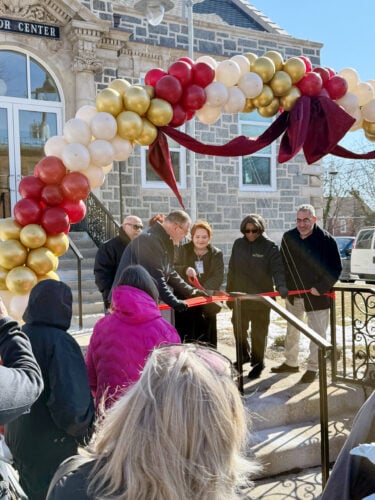Historic Women’s Vote
Excerpt from a book penned by a local author.

 The first American Equal Rights Association (AERA) member to visit Vineland was Lucy Stone, who arrived in the town ahead of her compatriots Susan B. Anthony and Elizabeth Cady Stanton by nearly a year. She, along with other suffrage advocates, appeared at a women’s rights convention at Plum Street Hall on November 29 and 30, 1867. Stone was one of the key speakers, and the convention would certainly prove an influence on the women in Vineland the following year…
The first American Equal Rights Association (AERA) member to visit Vineland was Lucy Stone, who arrived in the town ahead of her compatriots Susan B. Anthony and Elizabeth Cady Stanton by nearly a year. She, along with other suffrage advocates, appeared at a women’s rights convention at Plum Street Hall on November 29 and 30, 1867. Stone was one of the key speakers, and the convention would certainly prove an influence on the women in Vineland the following year…
According to The History of Woman Suffrage, Volume 3, in “1868, Mrs. Stanton and Miss Anthony attended a two days’ convention in Vineland and helped to rouse the enthusiasm of the people.” The two women put in an appearance at Plum Street Hall and attended a meeting of the Woman Suffrage Association of Vineland…
The impression Anthony and Stanton left on the town’s female population would be put into practice that autumn. By the end of October, 172 women residents decided they would cast votes in the presidential election in early November. Elizabeth A. Kingsbury’s account of Election Day in Vineland on November 3, written two days later and published in the November 19, 1868 edition of Anthony and Stanton’s newspaper, The Revolution, offers an intriguing view of the event:
At a meeting of women, held the week before election, a unanimous vote was taken that we would go to the polls. John Gage, chairman of the Woman Suffrage Association of Vineland, called a meeting, and though the day was an inclement one, there was a good attendance. A number of earnest men as well as women addressed the audience…At 7:30 A.M., November 3, John and Portia Gage and myself entered Union Hall, where the judges of election had already established themselves for the day…We seated ourselves in the chairs brought for the occasion, when one gentleman placed a small table for our use. Another inquired if we were comfortable and the room sufficiently warm. “Truly,’ we thought, ‘this does not look like a terrible opposition.”
Kingsbury notes what transpired next:
“As time passed, there came more men and women into the hall. Quite a number of the latter presented their notes at the table where those of men were received, where they were rejected with politeness, and then taken to the other side of the platform and deposited in our box. Shall I describe this box, twelve inches long and six wide, and originally a grape-box? Very significant of Vineland. Soon there came to the aid of Mrs. Gage and myself a blooming and beautiful young lady, Estelle Thomson, who, with much grace and dignity, sat there throughout the day, recording the names of the voters. It would have done you good to have witnessed the scene. Margaret Pryor…sat there in her nice Quaker bonnet by the side of Miss Thomson a great part of the day.
While the women’s votes in Vineland that day weren’t included in the final count, the results indicate that Ulysses S. Grant received 164 votes, his Democratic opponent, Horatio Seymour, received only 4 votes, Elizabeth Cady Stanton 2 votes, and candidates identified as Fremont and Mrs. Governor Harvey of Wisconsin 1 vote apiece. Anthony acknowledged the event in a letter to [Cornelius] Campbell ten days later: “Vineland women did splendidly on Election Day and will no doubt continue to do the same.”
The first convention of the New Jersey State Woman’s Suffrage Association was held in Vineland at Plum Street Hall on Wednesday December 2, 1868. The convention served as a reflection of the free-thinking movement that defined Vineland’s earliest decade. It was also a noteworthy achievement that earned the attention of the national press. The invitation to the event read: “All representatives who are opposed to the existing aristocracy, and who desire to establish a republican form of government in New Jersey, based upon the consent of the governed, are respectfully invited to attend. This is woman’s hour.” The convention established a platform for the movement in New Jersey and the 150 women in attendance witnessed Lucy Stone’s second appearance in town.
Excerpt is from Before the Wind: Charles K. Landis and Early Vineland by Vince Farinaccio, available at the Vineland Historical and Antiquarian Society. It is also available, as are two other books by this local author, at Lulu Publishing (lulu.com/shop).
This excerpt describes the 1868 historic women’s vote that will be re-enacted and celebrated in the events described in the box below. All are encouraged to attend and make history as a tribute to the courageous women of Vineland, past and present.
* * *
Women Needed To Re-Enact Historic Vote
Fifty-two years before the passing of the 19th amendment, 172 women from Vineland, including four African-Americans, symbolically cast their ballots for the 1868 presidential election. Led by Portia Gage, the women bravely set up their balsa wood blueberry crate in the corner of a backroom in Plum Street Hall and voted for the next U.S. president.
In honor of these trailblazing women, the Greater Vineland Chamber of Commerce and Vineland Historical and Antiquarian Society (VHAS) will host a voting reenactment followed by a celebration reception to recognize women of Vineland, past and present.
Calling all women: Come out and vote on Friday, September 27, from 10 a.m. to 6 p.m.: Vote at the VHAS (108 S. Seventh Street). You will vote yes/no on a question about equality for women and will receive a commemorative button. On Saturday, the 28th, between 9 a.m. and 12 noon, there’s another chance to vote and tour the VHAS Museum.
Then on Saturday, from 4 to 7 p.m., join in the Celebration at Merighi’s Savoy Inn (4940 E. Landis Avenue) for $50 per person (includes cash bar, live music, appetizers, and gift bag). Wear your patriotic attire, if you like. The original ballot box will be on display. Meet some of the 172 courageous Vineland women of 1868 (reenactors), including:
- Portia Gage, organizer of the 1868 event.
- Henrietta Crawford, one of four Black women who voted.
- Susan Fowler, who owned and operated a farm—and wore pants.
Honor a Voter of 1868 for $100: Call 856-691-7400 and you will be matched to an 1868 voter, recognized at the event and receive a commemorative pin.
Register online at vinelandchamber.org or call 856-691-7400 to join in the celebration.









